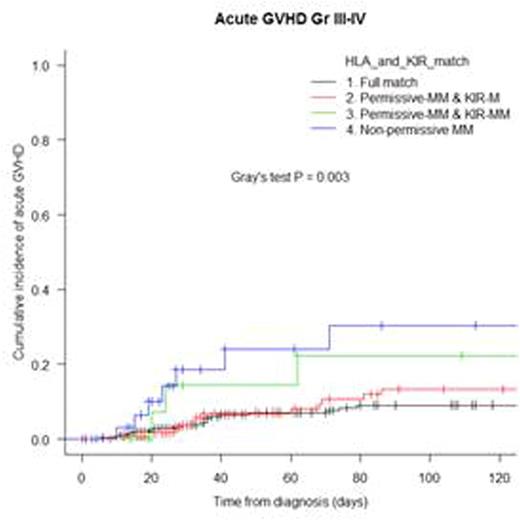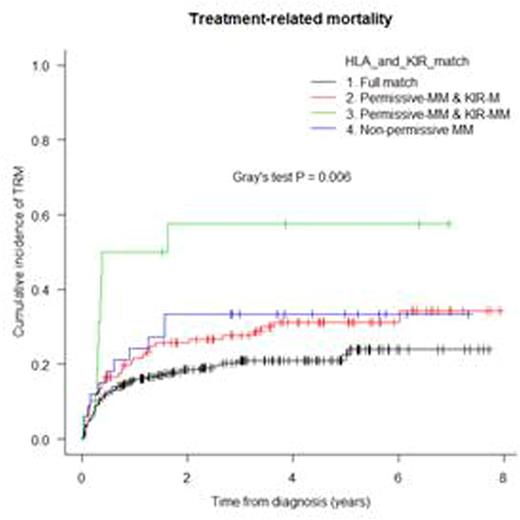Abstract
Background: Human leukocyte antigen (HLA) matching between donor and recipient is a key part of successful allogeneic hematopoietic cell transplantation (allo-HCT). The HCT from the unrelated donor (UD) with one allele/antigen mismatch (MM) can be as beneficial as HCT from perfectly matched donor. For the remaining patients, the donors with permissive mismatches may be the option. In HLA-mismatched transplantation, the patient and donor can also be mismatched for their killer cell immunoglobulin-like receptor (KIR) ligands that recognize allotypic determinants shared by certain HLA class I allele groups. Recent research has accumulated evidence of the role of each HLA locus and KIR ligand MM on clinical outcomes for UD-HCT. However, HCT outcomes of the patients with permissive MM depending on KIR ligand MM (KIR-L-MM) status remain obscure in UD-HCT.
In the current study, we identified permissive and nonpermissive MM allele combinations and analyzed the effects of these mismatches in combination of KIR ligand mismatches in patients with acute myeloid leukemia (AML).
Methods: A total of 438 patients with AML who underwent allo-HCT from UD from 2007 to 2014 were analyzed. Alleles of patients and donors at the HLA-A, -B, -C, and -DRB1 loci were identified by the high resolution DNA typing. Nonpermissive HLA allele combinations were defined as a significant HLA risk factor for severe acute graft-versus-host disease (aGVHD). KIR-L-MM among patient-donor pairs were searched in the Immuno Polymorphism Database available at www.ebi.ac.uk/ipd/kir.
Results: Median age of the patients was 45 (range 15-60) years and 117 patients (40.4%) were female. Eighty-five (19.4%) patients were high risk at the time of HCT. Reduced intensity conditioning was performed in 131 patients (29.9%) and anti-thymocyte globulin was used in 324 patients (74.0%). Primary graft source was peripheral blood stem cells (n=369, 84.2%) and median 6.0 x 106/kg cells were infused. Severe aGVDH occurred in 43 patients (9.8%) and chronic GVHD (cGVHD) in 193 (44.1%). With median follow-up duration of 19 (range, 2-96) months, treatment-related mortality (TRM) occurred in 111 patients (25.3%), relapse in 119 (27.2%) and death in 214 (48.9%).
Two-hundred sixty-four patients (60.3%) were HLA full matched in the 4 loci. Mismatches in HLA-A loci observed in 64 patients, HLA-B in 35, HLA-C in 98, and HLA-DRB1 in 60. Five nonpermissive MM pairs in 33 patients were identified as donor/patient pair: A*02:06/A*02:01, C*03:03/C*08:01, C*08:01/C03:04, C*08:01/C*15:02, and DRB1*04:03/DRB1*04:05. Among 98 patients with HLA-C loci MM, 16 patients showed KIR ligand MM (KIR-L-MM) as GvH direction, which was observed in the permissive MM group.
Severe aGVHD occurred in 30.4%, 22.4%, 13.4%, and 10.8% in nonpermissive, permissive MM and KIR-L-MM, permissive MM and KIR-L-M, and full match group, respectively (p=0.003). The 3-year overall survival (OS) rate was inferior in permissive MM and KIR-L-MM group (30.0%) compared to full match (53.5%), permissive MM and KIR-L-M (51.8%), and nonpermissive (42.4%) group (p=0.067). The 3-year TRM was higher in permissive MM and KIR-L-MM group (57.5%) than full match (21.0%), permissive MM and KIR-L-M (27.7%), and nonpermissive (33.3%) group (p=0.006). In the multivariate analysis, high risk at HCT (HR 2.087, p<0.001), severe aGVHD (HR 3.851, p<0.001), and cGVHD (HR 0.321, p<0.001) were identified as variables affecting the OS. The following variables adversely affected on TRM: permissive MM and KIR-L-MM group (HR 2.699, p=0.007), severe aGVDH (HR 2.204, p=0.001), and cGVHD (HR 2.052, p<0.001). Non-permissive MM (HR 7.487, p=0.001) and CD34+ cells >6x106/kg (HR 4.113, p=0.017) were high risk factors on severe aGVHD.
Conclusion: Permissive MM for HLA could be further classified into high risk groups with regard to TRM by KIR-L matching in UD-HCT. The evaluation of KIR-L matching is warranted to reduce unfavorable outcomes among the patients with permissive MM in UD-HCT.
No relevant conflicts of interest to declare.
Author notes
Asterisk with author names denotes non-ASH members.



This feature is available to Subscribers Only
Sign In or Create an Account Close Modal